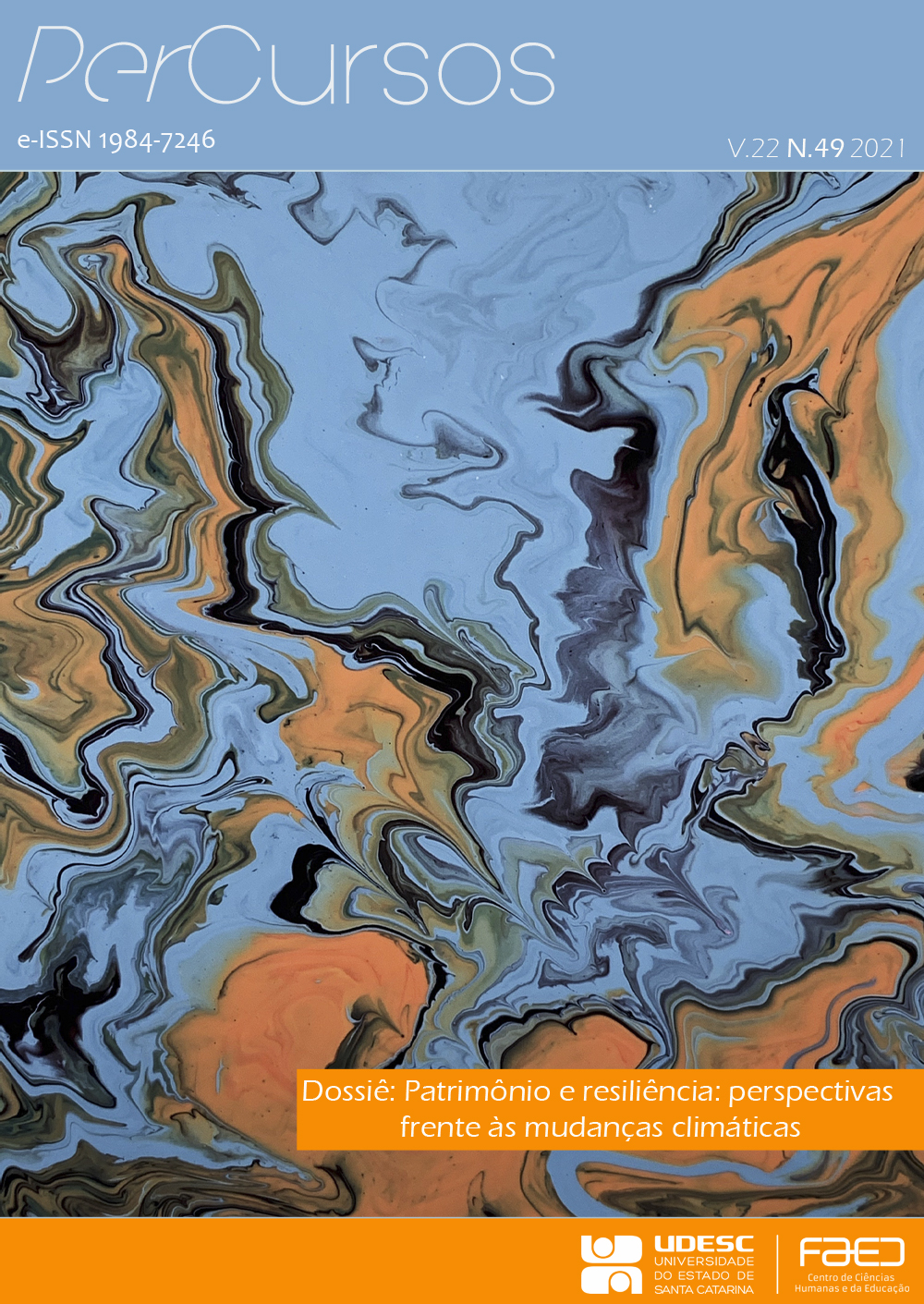Body, city and place: mappings and hybrid spaces
DOI:
https://doi.org/10.5965/1984724622492021296Keywords:
mapping, cyberspace, body and city, cartography, WorkshopAbstract
The usage of social media was significantly expanded in 2020, what made it necessary to analyze the geographical experience of networking and displacement in the pandemic. By increasing the use of digital technologies in our daily lives, due to the impossibility of fully enjoying the city, we have profoundly modified our physical, bodily and cultural relations with the city. The overlaps between the networks formed in the pandemic, with impact on the territory, and the virtual networks form hybrid spaces. Based on data from a doctoral research from the Postgraduate Program in Geography at the Federal University of Espírito Santo, Brazil, this study investigated the experience of mapping the networks of five women with community activities in the Centro district (downtown), in Vitória, Espírito Santo, symbolically and materially building another city. The premise is a knowledge process under construction, not necessarily linear or explicitly academic about the relationship between extensive and intensive mapping. The article addresses the relationship between body and city, mapping, displacement records and analysis of these hybrid spaces. In the conclusion, we rescued the extensive and intensive map relationship, the route built in the article and reflections on other possible paths for mapping.
Downloads
References
CARERI, Francesco. Caminhar e parar. São Paulo: Gustavo Gilli, 2017.
CARNEIRO, Sueli. Mulheres em movimento: contribuições do feminismo negro. In: HOLLANDA, Heloisa Buarque de (org.). Pensamento feminista brasileiro: formação e contexto. Rio de Janeiro: Bazar do tempo, 2019. 400 p.
GIRARDI, Gisele. Mapas desejantes: uma agenda para a Cartografia Geográfica. Pró-Posições, Campinas, v. 20, n. 3, p. 147-157, set./dez. 2009. Disponível em: https://www.scielo.br/scielo.php?pid=S0103-73072009000300010&script=sci_abstract&tlng=pt. Acesso em: 12 jan. 2021.
GIRARDI, Gisele. Modos de ler mapas e suas políticas espaciais. Espaço e Cultura, Rio de Janeiro: Universidade Estadual do Rio de Janeiro, n. 36, 2014. Disponível em: https://www.e-publicacoes.uerj.br/index.php/espacoecultura/article/view/19960/14300. Acesso em: 09 out. 2020.
GOMES, Paulo César Costa. Conceitos fundamentais da geografia. GEOgraphia, Niterói: Universidade Federal Fluminense, v. 20, n. 44, 2018. Disponível em: file:///C:/Users/Daus/Downloads/27557-95568-1-PB.pdf. Acesso em: 10 out. 2020.
JACQUES, Paola Berestein. Elogio aos errantes. Salvador: EDUFBA, 2012. Disponível em: https://repositorio.ufba.br/ri/bitstream/ri/7894/3/Elogio_aos_Errantes_RI.pdf. Acesso em: 14 maio 2019.
KITCHIN, Rob. Towards geographies of cyberspace: progres in human geography. [S.l.: s.n.], 1998. Disponível em: https://www.researchgate.net/publication/248134367_Towards_Geographies_of_Cyberspace. Acesso em: 25 de out. 2020.
LÉVY, Pierre. Cibercultura. 2. ed. São Paulo: Editora 34, 1999. Disponível em: https://mundonativodigital.files.wordpress.com/2016/03/cibercultura-pierre-Lévy.pdf. Acesso em: 10 out. 2020.
MASSEY, Doreen. Filosofia e política da espacialidade: algumas considerações. GEOgraphia, Niterói, v. 6, n. 12, p. 07-23, 2004.
MASSEY, Doreen. Pelo espaço: uma nova política da espacialidade. 1. ed. Rio de Janeiro: Bertrand Brasil, 2008.
MIRANDA, Clara Luiza; ALMEIDA, Lutero Proscholdt; MARTINS, Lucas. As ocupações no centro de Vitória, ES: moradia ou ruína? Salvador: ENANPARQ, 2018. Disponível em: https://www.academia.edu/40600356/AS_OCUPA%C3%87%C3%95ES_NO_CENTRO_DE_VIT%C3%93RIA_ES_MORADIA_OU_RU%C3%8DNA. Acesso em: 12 out. 2020.
MONTANER, Josep Maria; MUXÍ, Zaida. Arquitetura e política: ensaios para mundos alternativos. São Paulo: Gustavo Gilli, 2014.
VITÓRIA. Prefeitura Municipal. Portal do observatório de indicadores da cidade de Vitória. Vitória: [A prefeitura], 2020. Disponível em: https://observavix.vitoria.es.gov.br/tema/38. Acesso em: 02 jan. 2021.
PREVE, Ana Maria Hoepers. Geografias, imagens e educação: experiências. Entre-Lugar, Dourados, ano 4, n. 7, p. 49-66, 2013. Disponível em: https://ojs.ufgd.edu.br/index.php/entre-lugar/article/view/2673. Acesso em: 01 jan. 2021.
PREVE, Ana Maria Hoepers; HOEPERS, Ana Maria. Mapas, prisão e fugas: cartografias intensivas em educação. 347 f. 2010. Tese (Doutorado em Educação) – Faculdade de Educação, Universidade Estadual de Campinas, Campinas, 2010. Disponível em: http://repositorio.unicamp.br/handle/REPOSIP/251335. Acesso em: 23 fev. 2021.
RENA, Natacha; MAIA, Marcelo; SÁ, Ana Isabel de. Urbanismo tático e a produção do comum na metrópole biopolítica. Belo Horizonte: Fluxos, 2018. Disponível em: http://seminariourbanismobiopolitico.indisciplinar.com/wp-content/uploads/2018/06/06-01_Anais_Seminario-UB_FINAL_2-1.pdf. Acesso em: 15 out. 2020.
ROLNIK, Suely. Cartografia sentimental, transformações contemporâneas do desejo. Porto Alegre: Sulina: Editora da UFRGS, 2014.
Downloads
Published
How to Cite
Issue
Section
License
Copyright (c) 2021 PerCursos

This work is licensed under a Creative Commons Attribution-NonCommercial-NoDerivatives 4.0 International License.


